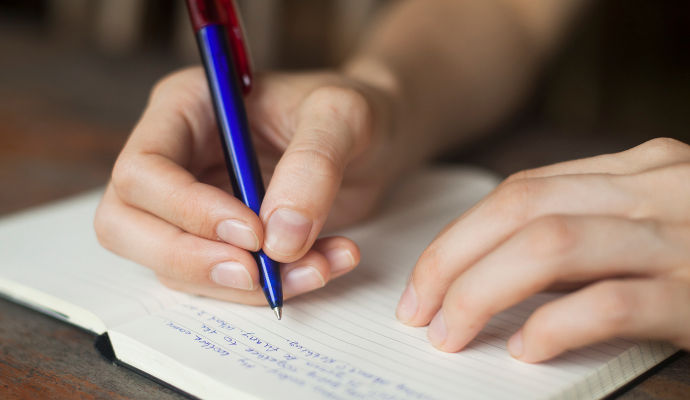|
8/23/2019 1 Comment 5 things to Journal about and whyThere is so much research about the benefits of journaling: stress relief, sparks creativity, improves confidence, helps with conflict resolution, improves writing, boosts memory, increases emotional intelligence, helps achieve goals, evokes mindfulness, improves health and healing, and makes you smarter.
But sitting down with a blank sheet of paper and expecting to pour oneself through the pen can be a bit daunting for even the most inspired writer. To help you get through that first step of putting pen to paper I’ve made a list of 5 things you can journal about and why. Write about goals and progress on goals Pro tip: You’re way more likely to achieve your goals if you simply write them down. The process of writing your goals signals to your brain that they are important and then your brain organizes and prioritizes based on that information. By journaling about your goals you not only are able to clarify what you’re really going for, you’re also able to expand upon them and push yourself to dream even bigger. Write about all of the details of how it will feel to achieve the goal, what it will look like, and the affect it will have on your and your loved ones. Then, write about your progress as you move forward so you can notice that you are evolving and expanding. This helps propel you toward your goal even more because you see the momentum that’s building and ride that wave to completion. Explore and resolve challenging experiences and emotions We all face difficult times in our lives and relationships, but it’s what we do during these times that make the biggest difference in our overall happiness. Journaling is a great way to relieve the stress of these situations and put things into context so we can process and release. Just putting the experience and accompanying emotions into words makes the experience knowable, and therefore manageable. Start by just getting it all out – even if it’s illegible and nonsensical. Don’t censor or edit yourself, just be in the ick and let it out. Once you’ve moved through the surface feelings and emotions, dive into the deeper layers of what’s really going on for you. Try seeing things objectively and write down your observations about your thoughts, emotions, and behaviors. Forgive yourself, and anyone else involved, for the confusion, hurt, and struggle. Then see if you can find a lesson or an opportunity for growth for yourself in this situation and journal about what that would look for you. Lastly, answer this question: How would I move forward in this situation from my deepest values and highest Self? Self reflection Use your journal to tap into what’s going on with yourself. Where are you at? How are you feeling? What’s going on for you? Getting your musings, ideas, and feelings onto paper help you to understand and assimilate them so you can move forward with more grace and joy. Imagine you’re talking with a really good friend that won’t judge you at all for any of your thoughts or feelings and just write. If you get stuck it might be helpful to go through some of the major categories of your life and reflect upon how you’re feeling about them: friendships, livelihood and impact, health, romantic relationship, creativity, community, play, and spiritual health. Don’t be afraid to go deep. Ask yourself the questions you’re afraid to ask. Get to know yourself. Develop your intuition Journaling is like speaking to yourself and listening at the same time. If you have any concerns, issues, or questions write them down and request your unconscious to come on board while you’re meditating or sleeping to bring you answers beyond your normal awareness. Then when you’re done meditating or when you awaken immediate write for ten minutes about any breakthroughs or revelations. You might be surprised what creativity and inspiration come to you! Reflect on the positive things in your life Journaling about a positive experience lets your mind relive it, which boosts confidence in your ability to create happiness. Start by just making a list of five things that you’re grateful for today. As you do this, you’ll become aware of awesomeness that is already present in your life. Practice being as present as possible with these pieces of joy in life. Writing about the good things changes your orientation from scarcity and stress to abundance and peace, simply by shifting your focus. Journaling is a super valuable practice in any amount, but making it a habit that you do every day creates profound change. If you’re feeling stuck around what to write about – try one of these five things and if none of them are calling you, just set a timer for five minutes, put your pen to paper, and write without stopping. Yes, some of what comes out will be craziness, and that’s okay! The point isn’t to write for the entertainment of others, it’s to provide an outlet for you to express, release, and reflect.
1 Comment
8/14/2019 1 Comment Energize Your BodyENERGIZE YOUR BODY
Three Realistic Practices for Health and Vitality Your body is the only thing you are guaranteed to keep for a lifetime. It forms the foundation of your earthly existence. Energizing your body enriches your life by enhancing every human capacity . If you lack vitality, nothing else really matters; if you have your health anything is possible. If you don't take care of your body, where will you live? A Foundation for Life If you haven't yet achieved optimal energy, vitality, and health, it is not because you haven't read or heard good advice on the topic,. Consider these words from Dr. Kenzo Futagil, M.D., who reached the century mark: "Eat less and chew well; ride less and walk often; have fewer clothes and launder often; worry less and work harder; waste less time and continue to learn; speak less and listen more; frown less and laugh more; complain less and appreciate more; take less and give more." Few of us would disagree with such advice, but how many of us can remember it much less incorporate all that into our lives? Good advice isn't enough. Because it's not about what we know, but about what we actually do (nearly) every day. Here's an example: Take one slow, deep breath -- as slowly and deeply as you can, without strain, first expanding your belly, and then your chest, and feel yourself relax as you slowly exhale. In the same manner, take two more deep breaths before proceeding. And from now on, for the rest of your life, take at least one deep, deliberate breath every hour. Take a nice deep breath right now and you've begun -- you've hardly stepped into the key and you have already learned an energizing practice for life. Back to the Body Many of us have a love-hate relationship with our bodies; we indulge them, deprive them, stuff them or starve them, overwork and underwork them, spoil them, punish them, enjoy them, suffer them, and, at times, feel betrayed by them. How many of us wish to fly free of our physical mortality, to travel out of our bodies before we've fully gotten into them . Energize Your Body begins by making peace with and coming to love and admire the body you've been given. In fact, your body is the only thing you are guaranteed to keep for an entire lifetime. You can't say that about your spouse, children, home, car, money, or beliefs -- only your body. It is your only real possession, so it pays to treat it well. If you do so, many other things fall into place. No matter where our flights of fancy take us, we return to a fundamental truth: The human journey begins and ends with the body. Reflections on Your Body: The following questions are intended to stimulate reflection on health, priorities, and energy in everyday life.
Energy is the most abundant substance in the universe; in fact it is the universe. You are made of energy; you take it in at the gross levels from the food you eat, and on more refined levels, from the air you breathe and from the people and natural world around you. Why, then, do we feel so little energy at times? The two most common reasons are physical (related to exercise, diet, and rest) and psychological (a lack of excitement or sense of purpose). The key to managing your physical energy is actually three-fold:
|


 RSS Feed
RSS Feed